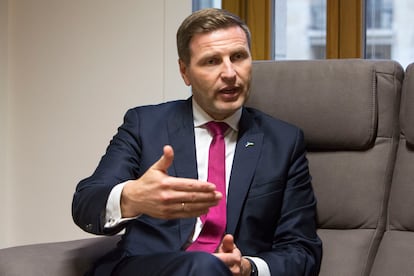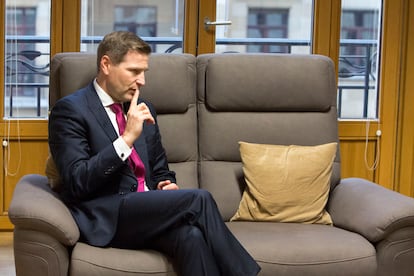Estonia’s Defense Minister: ‘The border separating Russia from Estonia and other countries is the border of civilization’
Hanno Pevkur wants to see more international support for Kyiv, which is fighting for ‘the free world,’ despite the impact from the energy crisis


Hanno Pevkur, 45, emphatically stresses that Ukraine needs more support and that it needs it now. The defense minister of Estonia – one of the EU members, along with the other two Baltic states and Poland, that has been most vocal in its support for Ukraine and in its demand for more sanctions against Russia – this week participated in a meeting with his European counterparts in Brussels, where the final go-ahead was given to a EU military training mission for Ukrainian forces. Hours after the conversation with EL PAÍS, an explosion on Polish soil in which two people died caused great alarm. Back in Tallinn, Pevkur was cautious about the incident that NATO, Poland and the United States have described as an accident caused by a Ukrainian anti-aircraft system that was trying to stop Russian missiles.
The Estonian minister believes that after Russia’s withdrawal from Kherson and as winter approaches, Russia is “desperately” looking for an option to negotiate. But “this is only for them to reorganise their troops. Putin in his mind cannot lose, and this is why we have to continue to help and support Ukraine as long as needed.”
Question. What information do you have about what happened in Poland?
Answer. Two Polish citizens are dead because of the war in Ukraine and what happened is linked to the attacks Russia conducted [Tuesday]. Nonetheless, it is too soon to speculate at this point about the final conclusions. We are waiting for official confirmation from Poland. First, we have to get the facts straight and then we can make decisions about any next steps. We are in close contact with our Polish friends and are getting more information every hour.
Q. What, in Estonia’s opinion, are the next steps for the EU and NATO?
A. The decision on what happens next will be made between Poland and all NATO allies; the response will be a coordinated one.
Q. Does the incident on Polish soil make it even more clear that the risk of escalation is very real?
A. The escalation started on February 24, and there has been a constant threat ever since. The focus of our attention should be on Russia’s war against Ukraine and on Russia’s indiscriminate carpet bombing of civilian infrastructure. It once again demonstrates that Ukraine needs more military assistance to defend its independence, sovereignty and territorial integrity in all military domains.
P. Is the support of the EU-27 still strong and united, or are we already seeing fractures?
A. The support is clear and strong. Right now, as we speak, there are air strikes against Ukraine and we see that they are coming from deep inside Russia, even from the Arkhangelsk region. This is yet another sign that we cannot end our support for Ukraine.
Q. With the Kremlin’s energy battle with the EU and as citizens begin to notice inflation hurting their pockets more and more, do you think that solidarity will falter?
A. It is our job to explain why we support and should continue to support Ukraine, because this is our war too, it is a war for a rules-based world. In Estonia inflation is around 20% and things are very difficult. My own gas bill has gone up 15-fold. We are all paying a price for what happened, a very high price, but that doesn’t mean we have to give in to Russia’s blackmail or stop supporting Ukraine. Especially Estonia, especially the eastern flank of NATO, because we are the main gateway of the Atlantic Alliance [to Russia].

Q. Estonia is one of the countries that is most vocal about supporting Ukraine. Are there great variations in support within the EU?
A. It is up to each country to decide how much it can provide and how, because some States do not have much military power to offer, but they do have other formulas, such as financial support. Estonia has supported Ukraine with approximately the equivalent of 30% of its annual defense budget, which is approximately 1% of our GDP. So yes, we are leaders in supporting Ukraine, but we are still looking for new options. We are finalizing a military field hospital, the third, together with other partners, and we are looking for more. We are providing training to Ukrainian soldiers in different fields, some of them ‘special’ and which I cannot openly disclose, and additional training to combat cyber-attacks. We are all fighting for the free world.
Q. The Ukrainian counter-offensive on the southern flank has been successful and is largely due to Western weapons. Now that the battle is at a turning point after the recapture of Kherson, do you think support will continue to flow? Should other steps be taken?
A. As long as Ukraine is fighting for its freedom, we have to help. It’s that easy. When we give them a Javelin [portable anti-tank weapon] and it’s used to knock out a Russian tank, there’s one less Russian tank behind the Estonian, EU and NATO border. Truly, I believe that the border separating Russia from Estonia and other countries is at the moment the border of civilization. On one side there is Russia, where there is no understanding or respect for human rights, nor for the freedom of people and integrity; on the other side, we understand what freedom means. That is the difference and why we are helping Ukraine.
Q. Before this war, Estonia, which borders Russia and has a long history of relations, had warned several times about the threat from the Kremlin. Do you think these warnings were not heeded?
A. Many European leaders have said several times that they should have listened to Estonia earlier. But now is not the time to boast about that and there is no point in going back in time. We have a war to win together with Ukraine, as they are fighting not only for themselves, but for the free world and what the security structure in Europe will look like in the coming decades.
Q. Now, with Moscow’s focus on the war in Ukraine, does Estonia feel that threat?
A. There is no immediate threat at Estonia’s border today. However, we all understand that we have to stay focused on closely monitoring what is going on behind our borders. We have raised our defense spending – for the next four years, our defense spending will be on average nearly 3% of our GDP. This will be invested in raising our defense capabilities – over 50% of the additional funding will go towards capabilities, which is well above the 20% NATO requirement. We will be developing our long-range fire capabilties (HIMARS), mid-range air defence capabilities, marine missiles, anti-tank weaponry, and much more.
Tu suscripción se está usando en otro dispositivo
¿Quieres añadir otro usuario a tu suscripción?
Si continúas leyendo en este dispositivo, no se podrá leer en el otro.
FlechaTu suscripción se está usando en otro dispositivo y solo puedes acceder a EL PAÍS desde un dispositivo a la vez.
Si quieres compartir tu cuenta, cambia tu suscripción a la modalidad Premium, así podrás añadir otro usuario. Cada uno accederá con su propia cuenta de email, lo que os permitirá personalizar vuestra experiencia en EL PAÍS.
¿Tienes una suscripción de empresa? Accede aquí para contratar más cuentas.
En el caso de no saber quién está usando tu cuenta, te recomendamos cambiar tu contraseña aquí.
Si decides continuar compartiendo tu cuenta, este mensaje se mostrará en tu dispositivo y en el de la otra persona que está usando tu cuenta de forma indefinida, afectando a tu experiencia de lectura. Puedes consultar aquí los términos y condiciones de la suscripción digital.








































